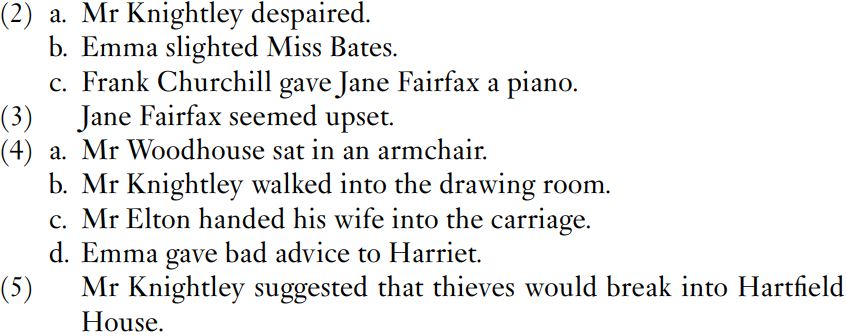
Individual verbs, complements and adjuncts
 المؤلف:
Jim Miller
المؤلف:
Jim Miller
 المصدر:
An Introduction to English Syntax
المصدر:
An Introduction to English Syntax
 الجزء والصفحة:
49-5
الجزء والصفحة:
49-5
 31-1-2022
31-1-2022
 2399
2399
Individual verbs, complements and adjuncts
We discussed the concepts of complement and adjunct. Every type of phrase has a head, and the modifiers of heads fall into the two classes of complement and adjunct. The distinction applies best to the modifiers of verbs, for which it was originally developed. Complements are modifiers which typically occur next to the head (but not always) and which are required or excluded by particular lexical items. In (1), Sarah and the cakes are complements of devoured. Devoured requires a noun phrase to its left and a noun phrase to its right – *Sarah devoured is unacceptable

Adjuncts are not necessarily next to the head; indeed, they are typically at a distance from the verb. They are not obligatory. Whereas complements ‘complete’ the meaning of the verb, giving it both syntactic and semantic completion, adjuncts merely provide additional information that could be dispensed with. In (1) in the kitchen and last night are adjuncts; (1) is acceptable and complete without them – Sarah devoured the cakes. Adverbs of time and location are always adjuncts. Adverbs of location have to be distinguished from adverbs of direction , a verb such as barge requires a directional adverb – Sarah barged into the kitchen – and a verb such as pushed allows it – Sarah pushed the pram and Sarah pushed the pram into the kitchen. Even where a verb merely allows a directional adverb, the latter is a complement, because there are verbs that exclude them – *Sarah was cooking into the kitchen. The fact that some (in fact, many) verbs exclude directional adverbs means that dictionary entries must include information about whether a given verb excludes an adverb of direction or not. This means that even for push, which allows rather than requires an adverb of direction, phrases such as into the kitchen are complements.
A given lexical verb controls various properties of its complements. Most obviously, it controls how many complements occur and what type of complements – noun phrases, adjective phrases, prepositional phrases or complement clauses.
Consider the examples in (2)–(5).
 In (2a–c), despaired excludes a noun phrase to its right, slighted requires one, and gave allows two noun phrases to its right. (We will see that the first of these noun phrases, for example Jane Fairfax in (2c), is felt to be less closely connected with the verb than the other noun phrase.) In (3), seemed is a verb that requires some phrase, here the adjective upset. A relatively small number of verbs allow adjective complements. In (4a), sat (in the sense of ‘was sitting’ as opposed to ‘sat down’) requires a prepositional phrase describing a location, here in an armchair. Remember that the label ‘prepositional phrase’ relates to the type of constituent, a phrase with a preposition as its head. In (4a), in is the head of the prepositional phrase in the armchair, and the armchair is the complement of in. Such phrases describing a location are said to function as adverbs of location, which is a shorthand way of combining information about their meaning and about their function – they modify verbs. Walked in (4b) allows just a prepositional phrase describing a direction, into the drawing room. (Note that this account of sit does not contradict the statement that adverbs of location are typically adjuncts. There are no verbs that exclude adverbs of location, merely some that require them.)
In (2a–c), despaired excludes a noun phrase to its right, slighted requires one, and gave allows two noun phrases to its right. (We will see that the first of these noun phrases, for example Jane Fairfax in (2c), is felt to be less closely connected with the verb than the other noun phrase.) In (3), seemed is a verb that requires some phrase, here the adjective upset. A relatively small number of verbs allow adjective complements. In (4a), sat (in the sense of ‘was sitting’ as opposed to ‘sat down’) requires a prepositional phrase describing a location, here in an armchair. Remember that the label ‘prepositional phrase’ relates to the type of constituent, a phrase with a preposition as its head. In (4a), in is the head of the prepositional phrase in the armchair, and the armchair is the complement of in. Such phrases describing a location are said to function as adverbs of location, which is a shorthand way of combining information about their meaning and about their function – they modify verbs. Walked in (4b) allows just a prepositional phrase describing a direction, into the drawing room. (Note that this account of sit does not contradict the statement that adverbs of location are typically adjuncts. There are no verbs that exclude adverbs of location, merely some that require them.)
Handed in (4c) requires a noun phrase to its right, here his wife, and a prepositional phrase describing a direction, here into the carriage. Gave in (4d) allows the same types of complement as handed; ‘allows’ and not ‘requires’ because gave also occurs with two noun phrases as in (2c). Note that not all verbs of giving or assigning behave like give. Attribute requires the structure in (4d) but not the structure in (2c) – Everyone attributed good intentions to Frank Churchill vs *Everyone attributed Frank Churchill good intentions. Finally, suggested in (5) is a verb that allows an ordinary noun phrase to its right, as in Mr Knightley suggested this plan, but it also allows a complement clause, here that thieves would break into Hartfield House.
Since very many verbs exclude a complement clause, the information that a complement clause is allowed must be stated in the dictionary entries for individual verbs.
 الاكثر قراءة في Syntax
الاكثر قراءة في Syntax
 اخر الاخبار
اخر الاخبار
اخبار العتبة العباسية المقدسة


